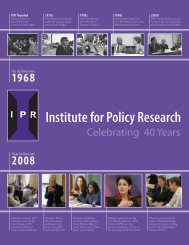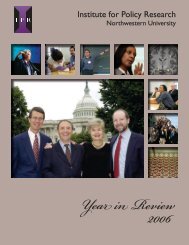Whatever Happened to the Emerging Democratic Majority?
Whatever Happened to the Emerging Democratic Majority?
Whatever Happened to the Emerging Democratic Majority?
Create successful ePaper yourself
Turn your PDF publications into a flip-book with our unique Google optimized e-Paper software.
P. Reese<br />
P. Reese<br />
7<br />
Consequences of Mass Incarceration<br />
D.C. policy briefing discusses effects on jobs, voting rights, and children<br />
Despite falling crime rates, two million<br />
Americans are locked up in prison, an<br />
increase of 500 percent over <strong>the</strong> past<br />
30 years. Manda<strong>to</strong>ry sentencing and <strong>the</strong><br />
war on drugs have played a large part in<br />
this increase, with drug offenders fi ve<br />
times more likely <strong>to</strong> be sentenced <strong>to</strong><br />
prison—and receive sentences twice<br />
as long—than <strong>the</strong>y were 20 years ago.<br />
Three experts discussed some of <strong>the</strong><br />
consequences of this massive prison<br />
population before 63 policymakers,<br />
advocates, and scholars at a May 13 IPR<br />
policy briefi ng in Washing<strong>to</strong>n, D.C. The<br />
briefing was supported by a grant from<br />
<strong>the</strong> Joyce Foundation.<br />
Discrimination in employment<br />
Of <strong>the</strong> two million prisoners currently incarcerated, roughly 95<br />
percent will be released at some point. Most will look for a job,<br />
but <strong>the</strong>y will fi nd <strong>the</strong>ir options severely limited, particularly if<br />
<strong>the</strong>y are African American. As Devah Pager, assistant professor<br />
of sociology at Prince<strong>to</strong>n, pointed out, <strong>the</strong> incarceration rate of<br />
blacks is seven times that of whites. Nearly one in three young<br />
black men will eventually serve time in a prison.<br />
To test how a criminal record affects job prospects, Pager<br />
hired 20 young men, carefully matched on qualifi cations,<br />
appearance, and o<strong>the</strong>r characteristics, <strong>to</strong> apply for entry-level<br />
jobs in Milwaukee (8) and New York City (12). Applying for<br />
hundreds of <strong>the</strong> same jobs in black and white pairs, team<br />
members <strong>to</strong>ok turns posing as an ex-offender with a felony<br />
drug conviction.<br />
In both cities, <strong>the</strong> callback rate for blacks and whites with a<br />
criminal background was one-third <strong>to</strong> one-half less than those<br />
without. More troubling, <strong>the</strong> callback rate for whites with a<br />
felony conviction was <strong>the</strong> same or higher than that of blacks<br />
with no criminal his<strong>to</strong>ry.<br />
“These results show that being black is essentially equivalent<br />
<strong>to</strong> having a felony conviction, at least in <strong>the</strong> eyes of <strong>the</strong>se<br />
employers,” Pager said. The irony, she continued, is that<br />
discrimination keeps <strong>the</strong>se young men from fi nding steady<br />
jobs, yet a steady job keeps individuals from turning <strong>to</strong> crime<br />
<strong>to</strong> survive.<br />
Second-class citizens<br />
In addition <strong>to</strong> <strong>the</strong> difficulty of making an honest living, ex-felons<br />
often fi nd <strong>the</strong>mselves relegated <strong>to</strong> second-class citizenship.<br />
Jeff Manza, Northwestern professor of sociology and acting<br />
direc<strong>to</strong>r of IPR in 2004-05, explained that depending on which<br />
state <strong>the</strong>y live in, felons can lose <strong>the</strong> right <strong>to</strong> vote, hold public<br />
offi ce, and serve on juries. These penalties often extend well<br />
beyond a period of incarceration.<br />
“There is no country in <strong>the</strong> world o<strong>the</strong>r than <strong>the</strong> United<br />
States that disenfranchises such large numbers of non-<br />
Jeff Manza talks about<br />
felon disenfranchisement.<br />
incarcerated felons,” Manza said. Of<br />
<strong>the</strong> 5.3 million ex-felons unable <strong>to</strong><br />
vote, one million are in Florida alone.<br />
In several states, disenfranchisement<br />
laws bar more than one-fi fth of <strong>the</strong><br />
African American population from<br />
voting. Only two states, Maine and<br />
Vermont, have no restrictions on<br />
felon voting rights.<br />
Recent surveys show two-thirds<br />
of <strong>the</strong> public support enfranchising<br />
current probationers and parolees,<br />
and similar or greater percentages<br />
support res<strong>to</strong>ring voting rights for<br />
ex-offenders.<br />
Manza concluded that felon disenfranchisement<br />
does not achieve any of <strong>the</strong> “logical goals” of<br />
punishment—rehabilitation, incapacitation, and deterrence—<br />
nor does it protect democracy. There is some evidence <strong>to</strong><br />
suggest that bringing ex-offenders back in<strong>to</strong> <strong>the</strong> political system<br />
discourages future criminal activity, he said.<br />
Children of incarcerated fa<strong>the</strong>rs<br />
Not only does prison serve <strong>to</strong> disconnect former inmates from<br />
society, but it also seems <strong>to</strong> do <strong>the</strong> same for <strong>the</strong>ir children.<br />
IPR Faculty Associate John Hagan, <strong>the</strong> John D. MacArthur<br />
Professor of Sociology and Law at Northwestern, revealed<br />
that half of <strong>the</strong> men in jail are fa<strong>the</strong>rs, and 12 percent of U.S.<br />
children have at least one parent in <strong>the</strong> penal system.<br />
Evidence suggests that an incarcerated parent sets <strong>the</strong> child<br />
on a course for “institutional disconnection” as he or she grows<br />
older, Hagan said. Adolescents<br />
with an incarcerated parent<br />
are three times more likely<br />
<strong>to</strong> be homeless. They are two<br />
times less likely <strong>to</strong> have health<br />
insurance, and twice as likely<br />
not <strong>to</strong> vote.<br />
Most important, <strong>the</strong>se<br />
children fall behind in <strong>the</strong>ir<br />
educational achievement, which<br />
is probably <strong>the</strong> biggest fac<strong>to</strong>r<br />
behind <strong>the</strong>ir disengagement<br />
from society.<br />
Hagan singled out a particularly<br />
vulnerable subgroup—<br />
Carla Smalls of <strong>the</strong><br />
National Institute of<br />
Corrections asks a question.<br />
daughters whose biological fa<strong>the</strong>rs are incarcerated. They<br />
are two times more likely <strong>to</strong> be sexually abused, and three<br />
times more likely <strong>to</strong> leave home and become homeless, he<br />
explained.<br />
For more information on <strong>the</strong> policy briefing or <strong>to</strong> see<br />
<strong>the</strong> video, please go <strong>to</strong> www.northwestern.edu/ipr/<br />
events/briefingMay05.html
















